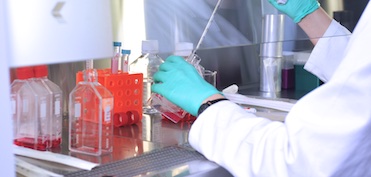The research group is investigating the mechanisms of pathogen perception at the molecular level. For this purpose, active substances must be tested on living cells. Different cells, such as neurons or immune cells, are quickly tested under physiological conditions in the laboratory with hundreds or thousands of active substances.
The results of these screenings are combined with targeted molecular and bioinformatic analyses and their verification in animal models. This means that even complex cellular and pharmacological relationships can be understood in a relatively short time.
The researchers are working with the cell lines:
HEK293 (Human Embryonic Kidney Cells)
U-87 (gliablastoma cell line)
HL60 (immune stem cell line).
The cell cultures are cultivated in standardized high-throughput formats (96 well-plates).
The highly effective transient transfection of the cell lines with different receptor types enables realistic
in vitro models for high-throughput pharmacology and binding studies.
